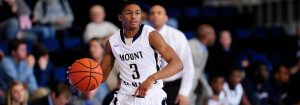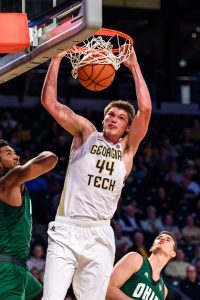Bigger is not always better: just ask 5’5″ G Junior Robinson, who made the go-ahead basket for the Mount in their 1-PT win over New Orleans in the NCAA tourney last March. After arriving in Emmitsburg in 2014 he was named to the NEC All-Rookie Team, then was named 2nd-team All-NEC in each of the past 2 seasons. After leading the team in AST as a sophomore and being named to the NEC All-Tournament team as a junior, we cannot wait to see what is in store as he enters his senior year. HoopsHD’s Jon Teitel got to chat with Junior about his height and being a great shooter.
You are the shortest basketball player in D-1 at 5’5”: do you see your size as an advantage or disadvantage on the court? Everyone sees my size and thinks “Oh, he is too short or too small.” That keeps a constant chip on my shoulder and makes me always play extra-hard. My favorite saying is “heart over height”: a lot of guys have the height but I guarantee you that they do not have the heart I have.
You play for Coach Jamion Christian: what makes him such a good coach, and what is the most important thing that you have learned from him? He keeps us positive and lets us learn from our mistakes. Most coaches are quick to jump on you after a turnover or any other mistake. Another thing I like is that he always jokes with us and interacts with us a lot. It could be any type of communication such as a text asking how we are feeling or just randomly popping in to have lunch with us. He has taught me a lot but the most important thing is believing that I belong on the court with each team that we play against. He also has taught me how to be a better leader in all areas of my life and I thank him for that.
In 2015 you started all 30 games and were named to the All-Rookie Team: how were you able to come in and contribute right from the start? Just my teammates believing in me and trusting in my growing process. The coaches also helped me learn which things work and which do not.
You started 1-11 last season (thanks to road games against high-major opponents including West Virginia/Iowa State/Minnesota/Michigan/Arkansas), then went 11-1 in your next 12 games: did it feel like a tale of 2 seasons? Our goal all year was to win the NEC. We started off rough but at the same time we did not set out to win all of those games. I know that nobody likes to lose but we learned a lot about how good we could be by playing those tough games.
Last year you shot 39.8 3P% and your 86.8 FT% was #1 in the conference: what is your secret for being a great shooter? Just constant work and finding ways to get off good shots. I take around 1000-1500 shots a day: not just to shoot the ball but to see it go in and give myself confidence that I can make any shot that I take.
Your 1201 minutes last season were #2 in the conference: how exhausted were you by the end of the year? I will not lie: it was rough but when you are out there competing none of the minutes matter. I care about winning and it does not matter to me how many minutes I play.
Last spring you were named to the NEC All-Tournament team after averaging 20.7 PPG in 3 games: what did it mean to you to win a title? It gave our team a chance to live a dream that we always wanted and we gave our seniors their 2nd trip to the NCAA tourney. It meant a lot to be able do something that had never been done in Mount history.
In the 2017 1st 4 you scored 23 PTS including the go-ahead basket in a 1-PT win over New Orleans: how were you able to play your best when it mattered the most? Just the desire to win. We got a chance to make a name for ourselves and our school as well. I did not want to lose that opportunity and neither did my teammates. I played and fought for every person on our sideline to keep our season going.
Your non-conference schedule this year includes games against Marquette/Notre Dame/Georgetown/Pitt: which of these games do you feel will present your biggest test? Every game is a challenge no matter who you play. Those games are tests to find our identity and find out what we can do this year as a group.
What are your goals for the upcoming season, and what are your expectations for the upcoming season? Of course I want to repeat as champions but right now my goal is to bring the young guys along and show them how we were able to be successful last year. If I can be successful then the sky is the limit for us.






Doing the Right Thing is Wrong – The Braxton Beverly Decision
Braxton Beverly is a four-star point guard from Kentucky that attended Hargarve Military Academy in Virginia. As a sought-after recruit, he ended up being a big addition when Thad Matta recruited him to play for the Ohio State Buckeyes starting this season. Braxton did everything right, and now, thanks to the genius of the NCAA, he has to pay for it.
Braxton graduated high school and committed to Ohio State. He decided to get a jump on his college career, enrolling for a pair of summer classes in Columbus. This has the signs of nothing other than a hard-working kid (hey, he did go to a military academy!), who committed to a head coach and decided to get ahead of the game in his academics.
Then came the firing. Thad Matta was terminated at Ohio State and Braxton, for reasons that are between him and new head coach Chris Holtmann, decided that he did not want to attend Ohio State. His separation from the Buckeyes was amicable, and he signed to play his career for Kevin Keatts at North Carolina State. He had started a pair of summer courses but did not finish them, thus gaining nothing other than a few hours in the classroom from Ohio State.
The NCAA has now declared that Braxton cannot play at NC State this season, but must sit out the entire year as a transfer (he will have all four years of eligibility left at least). The reason for this decision was that, due to his enrollment in two summer course, Braxton is now a transfer student. Regardless of whether you feel that transfers should even have to sit out a year, to apply this rule in Braxton’s case, where he did absolutely nothing wrong, is utterly ridiculous. He wanted to play for Thad Matta – it was not his fault Ohio State fired him. He wanted to get ahead in his coursework — he did the right thing and now has to sit out a year. The worst part is that it is our understanding he isn’t even getting credits for having completed those courses — all he did was enroll in them for a few weeks.
The last time I checked, the NCAA Core values were as follows:
“The Association – through its member institutions, conferences and national office staff – shares a belief in and commitment to:
[Source: http://www.ncaa.org/about/ncaa-core-values]
Braxton Beverly is a student-athlete. The word “student” comes first in that term. He tried to get ahead of the game and take a few summer courses, using the “supporting role that intercollegiate athletics play in the higher education mission” the way it was intended. Instead, he is now being unfairly penalized. He was acting in “pursuit of excellence in both academics and athletics”. For this, he has to sit and watch his teammates from the sideline this year.
The message being sent by the NCAA in denying Braxton’s application for a waiver and subsequent appeal of that waiver is clear. Don’t enroll in summer courses. Don’t try to get ahead. Don’t put academics first. Combine this with the recent rulings from the North Carolina investigation and it becomes “we would rather you take fake courses that you do not even need to attend than actually put in the work.” Why do we even bother sending these kids to classes at all? Let’s just let them play basketball for four years and, if they don’t become pros, there are plenty of minimum wage jobs available. Maybe I am naive to believe that the term student-athlete means something, but if it does, the least the NCAA could do is reward those that put student first instead of punish them.